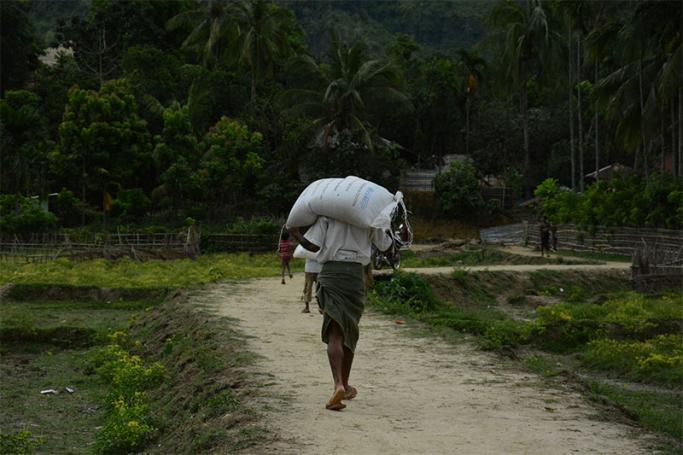Lileya Ketali, a 61-year-old farmer lives in Gone Nar, one of the villages affected by previous incidence of violence in Maungdaw Township, Rakhine State. Similar to the majority of villagers, he relies on subsistence agriculture, with paddy being a main crop during the monsoon season.
Having only four acres of land, he hires casual labour to work on his farmland and covers their cost with harvested paddy. The remaining crop he uses for food consumption and stores for replanting in the following year.
Although the monsoon planting season is going to start very soon, farmers like him lack much needed agricultural inputs, that could be partially attributed to movement restrictions following the attack on a Border Guard Police (BGP) in October 2016 that prevented some farmers from harvesting. The losses are going to affect villagers like LileyaKetali who was unable to store enough seeds and faced food shortages.
Adding to the challenge is that Lileya Ketali does not have access to quality fertilizers or enough income to purchase locally available fertilizer (approximately USD 25 for 50 kg bag) that would enable him to increase paddy production.
In order to respond to these critical needs, the Food and Agriculture Organization of the UN with the funding from the UN’s Central Emergency Response Fund (CERF) is currently providing high quality agricultural inputs adequate for the monsoon season. This includes the distribution of paddy seeds, compound and urea fertilizers, and vegetable kits to 2032 beneficiary households (approximately 10,363 people) in Maungdaw Township. With aim to increase the variety of foods in farmers diet, FAO is distributing vegetable seeds packages that consist of white radish, okra, chili, eggplant and bitter gourd.
As well as targeting Maungdaw, a total of 1610 households (approximately 8,211 people) in Buthidaung will benefit from provision of goats (2 goats per household). To ensure best use of provided inputs, FAO is going to organize trainings on best agricultural practices and animal husbandry.
“If I wouldn’t receive paddy seeds from FAO I would not be able to plant this year as I didn’t have sufficient amount of seeds. Also, I haven’t previously used compound fertilizer because it is not available on the local market and I do not have money to buy the local fertilizer,” said Lileya Ketali.
“FAO shares a long history of collaboration with CERF in support of conflict-affected communities in Northern Rakhine,” said Andrea Berloffa, FAO Senior Resilience Coordinator. “Based on our previous experience we know that this type of intervention is particularly well received by farmers as the distribution of quality seeds allows for swift restoration of food production, while complementary livestock provision enhances farmers access to food and gives them the chance of gaining additional income. “
Current FAO’s emergency response in Northern Rakhine State that helps protect and restore rural livelihoods will end in August 2017. In order to continue the livelihood life-saving assistance FAO is appealing to the donors for additional funding.
You are viewing the old site.
Please update your bookmark to https://eng.mizzima.com.
Mizzima Weekly Magazine Issue...
14 December 2023
Spring Revolution Daily News f...
13 December 2023
New UK Burma sanctions welcome...
13 December 2023
Spring Revolution Daily News f...
12 December 2023
Spring Revolution Daily News f...
11 December 2023
Spring Revolution Daily News f...
08 December 2023
Spring Revolution Daily News f...
07 December 2023
Diaspora journalists increasin...
07 December 2023
Stay-at-Home Order in seven townships of Yangon region as COVID cases reach 919












